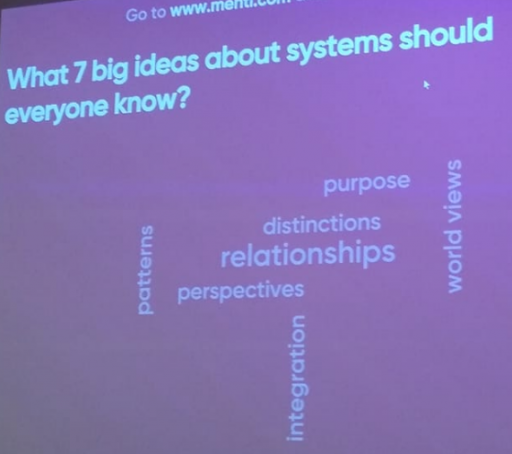A slide at ISSS wonders what the big ideas about systems are:

*
Here’s my take:
- Stocks & flows – a.k.a. states and rates, levels and rates, integration, accumulation, delays – understanding these bathtub dynamics is absolutely central.
- Feedback -positive and negative feedback, leading to exponential growth and decay and other simple or complex behaviors.
- Emergence – including the idea that structure determines behavior, the iceberg, and more generally that complex, counter-intuitive patterns can emerge from simple structures.
- Relationships – ranging from simple connections, to networks, to John Muir’s insight, “When we try to pick out anything by itself, we find it hitched to everything else in the Universe.”
- Randomness, risk and uncertainty – this does a disservice by condensing a large domain in its own right into an aspect of systems, but it’s certainly critical for understanding the nature of evidence and decision making.
- Self-reference, e.g., autopoiesis and second-order cybernetics.
- Evolution – population selection and modification by recombination, mutation and imitation.**
- Models – recognizing that mental models, diagrams, archetypes and stories can only get you so far – eventually you need simulation and other formal tools.
- Paradigms – in the sense in which Dana Meadows meant, “The mindset or paradigm out of which the system — its goals, power structure, rules, its culture — arises.”
If pressed for simplification, I’ll take stocks, flows and feedback. If you don’t have those, you don’t have much.
* h/t Angelika Schanda for posting the slide above in the SD Society Facebook group.
** Added following a suggestion by Gustavo Collantes on LinkedIn, which also mentioned learning. That’s an interesting case, because elements of learning are present in ordinary feedback loops, in evolution (imitation), and in self-reference (system redesign).
